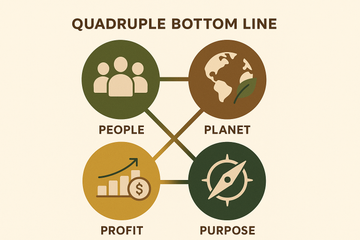At Wyoming Hemp Company, we believe in making great products. We also believe in having a great purpose. Hemp is not just a crop; it's a catalyst for healthier communities, a thriving planet, profitable innovation, and a shared mission to leave the world better than we found it.
The numbers don't lie: hemp is one of nature's most powerful tools for sustainable transformation. From animal bedding to building materials to biofuel, hemp has the potential to reshape entire industries. But it's not just the plant—it's the partnerships. When entrepreneurs unite around the quadruple bottom line—People, Planet, Profit, and Purpose—sustainability doesn't just happen; it grows, scales, and inspires.
The Power of Hemp: By the Numbers
Growth & Productivity
-
120 days: Hemp grows from seed to harvest in just 4 months—4x faster than trees
-
12-16 feet: Average height hemp reaches in a single growing season
-
6-10 tons: Biomass yield per acre (compared to 3-6 tons for most crops)
-
3-7 tons: Fiber yield per acre (vs. 0.5-1 ton per acre for cotton)
Environmental Impact
-
8.9 tons CO₂: Amount absorbed per acre during one growing season—more than most forests
-
50% less water: Required compared to cotton production
-
Soil improvement: Hemp's deep roots break compaction and add organic matter
-
120+ days: How long hemp continues absorbing CO₂ after harvest (in building materials)
Economic Potential
-
$5.7 billion: Projected U.S. hemp market size by 2025
-
75,000+ jobs: Created in the hemp industry since 2018 legalization
-
25,000+ products: Can be made from hemp (food, textiles, construction, fuel)
The Quadruple Bottom Line: How Hemp Delivers
1. People – Healthier Products, Stronger Communities
For Animals: Our premium hemp bedding is dust-free, highly absorbent (absorbing 4x more moisture than wood shavings), and naturally antimicrobial—providing cleaner, safer environments for livestock, poultry, and pets.
For Communities: Hemp farming creates jobs, supports rural economies, and gives farmers a profitable, regenerative alternative to commodity crops.
2. Planet – Regenerative and Renewable
Carbon Champion: Hemp absorbs 1.63 tons of CO₂ per ton of hemp produced, which makes it one of the most effective carbon-negative crops on Earth.
Resource Efficiency:
-
Uses 50% less water than cotton
-
Produces 220% more fiber per acre than cotton
-
Requires no pesticides or herbicides
-
Restores soil health through deep root systems and nitrogen fixation
Waste Reduction: Hemp products are 100% biodegradable and can replace petroleum-based plastics that take centuries to decompose.
3. Profit – Scalable, Future-Ready Markets
Market Growth: The global hemp market is growing at 15.8% annually and is projected to reach $18.6 billion by 2027.
Diverse Revenue Streams:
-
Hemp fiber: $4-6 per pound
-
Hemp seeds: $3-8 per pound
-
Hemp oil: $15-25 per pound
-
Hempcrete: 50% cost reduction in building insulation
4. Purpose – Driving Positive Change
Climate Impact: If just 10% of U.S. farmland grew hemp, it could sequester 160 million tons of CO₂ annually—equivalent to removing 35 million cars from the road.
Our mission is to make hemp part of everyday life while building a future that's healthier, cleaner, and more resilient. Purpose is the "why" behind every partnership we form—aligning our work with values that matter.

Applications That Transform Industries
Bedding: Superior Performance, Proven Results
-
400% more absorbent than wood shavings
-
Lasts 3x longer between cleanings
-
Reduces ammonia levels by 95% in animal housing
-
Composts in 60-90 days vs. 2+ years for wood bedding
Buildings: Hemp as a Construction Game-Changer
-
Hempcrete buildings use 70% less energy for heating and cooling
-
Carbon negative: Continues absorbing CO₂ for decades after construction
-
Naturally pest and mold resistant
Biofuel: Powering the Future with Plants
-
Hemp biodiesel produces 97% fewer greenhouse gases than petroleum diesel
-
Hemp ethanol yields 270 gallons per acre (competitive with corn)
-
Hemp stalks contain 65-70% cellulose—ideal for biofuel production
-
Can grow on marginal land unsuitable for food crops
Partnership is the Path Forward
No single company can transform the world alone. That's why Wyoming Hemp Company partners with farmers, innovators, manufacturers, and change-makers who share our quadruple-bottom-line vision.
The opportunity is massive: With only 146,065 acres of hemp licensed in the U.S. in 2022 (compared to 93 million acres of corn), we're just scratching the surface of hemp's potential.
Together, we can build solutions that work for people, protect the planet, turn a profit, and fulfill a deeper purpose. From bedding that keeps animals healthier, to buildings that breathe, to fuels that power the future—hemp is more than a product; it's a shared mission.
And we're here to lead that mission—one partnership at a time.
Ready to Join the Hemp Revolution?
If you're ready to partner for profit and purpose, reach out to us today. Let's create something that lasts—economically, environmentally, socially, and purposefully.
📩 Contact Wyoming Hemp Company to start building a better tomorrow with hemp.
Email: info@wyominghemp.us
Resources & References
Research Sources:
-
USDA National Agricultural Statistics Service - Hemp Production Reports
-
Hemp Industry Association Market Research
-
Journal of Cleaner Production - Hemp Environmental Impact Studies
-
International Association for the Study of Pain - Hemp Applications Research
Industry Organizations:
-
Vote Hemp (votehemp.com) - Industry advocacy and statistics
-
Hemp Industries Association (thehia.org) - Trade association and market data
-
National Hemp Association (nationalhempassociation.org) - Farmer resources and education
-
Hemp Business Journal (hempbizjournal.com) - Market analysis and trends
Government Resources:
-
USDA Hemp Production Program (usda.gov/hemp)
-
FDA Hemp Information (fda.gov/hemp)
-
State Hemp Programs Directory - Individual state regulations and licensing
Academic Research:
-
Colorado State University Hemp Research
-
University of Kentucky Industrial Hemp Research
-
Oregon State University Global Hemp Innovation Center
For the most current hemp statistics and market data, visit these trusted sources regularly as the industry continues its rapid evolution.

